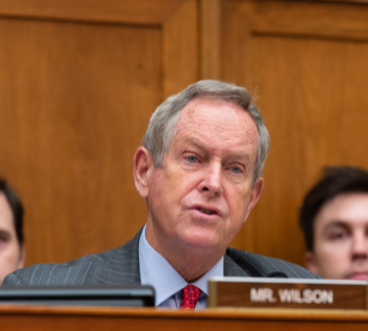Czech Republic

BRIEFING – Contesting Russia: Lessons from Cen...
Oct 23, 2024Cannon House Office Building, Room 210 Stream live here For years, the countries of Central & Eastern Europe have been a critical warning system for the rest of Europe, sounding […]

European Energy Security Post-Russia
Jun 07, 2022Russia is weaponizing energy to prolong its unlawful invasion of Ukraine. Unfortunately, the sanctions that Europe and the United States have put in place have not been enough to curb […]
European Energy Security Focus of Upcoming Helsinki ...
Jun 02, 2022WASHINGTON—The Commission on Security and Cooperation in Europe, also known as the Helsinki Commission, today announced the following hearing: EUROPEAN ENERGY SECURITY POST-RUSSIA Tuesday, June 7, 2022 2:30 p.m. Watch […]

Ranking Member Joe Wilson on July 2021 Congressional...
Jul 21, 2021Mr. Speaker, this month, I was grateful to participate in a Congressional delegation of the OSCE Parliamentary Assembly led by Senator Roger Wicker and Senator Ben Cardin. It was inspiring […]
Sweden’s Leadership of the OSCE
Jun 11, 2021In 2021, Sweden chairs the world’s largest regional security organization—the Organization for Security and Cooperation in Europe (OSCE)—which comprises 57 participating States stretching from North America, across Europe, and to […]
Swedish Foreign Minister Ann Linde to Appear at Hels...
Jun 03, 2021WASHINGTON—The Commission on Security and Cooperation in Europe, also known as the Helsinki Commission, today announced the following online hearing: SWEDEN’S LEADERSHIP OF THE OSCE Priorities for 2021 Friday, June […]

Helsinki Commission Commemorates 45 Years of Advanci...
Jun 03, 2021WASHINGTON—To commemorate the 45th anniversary of the Commission on Security and Cooperation in Europe, also known as the U.S. Helsinki Commission, on June 3, Chairman Sen. Ben Cardin (MD) and […]

Albanian Prime Minister Edi Rama to Appear at Helsin...
Sep 09, 2020WASHINGTON—The Commission on Security and Cooperation in Europe, also known as the Helsinki Commission, today announced the following online hearing: ALBANIA’S CHAIRMANSHIP OF THE OSCE Responding to the Multiple Challenges […]

2019 Human Dimension Implementation Meeting
Sep 13, 2019From September 16 to September 27, OSCE participating States will meet in Warsaw, Poland, for the 2019 Human Dimension Implementation Meeting (HDIM), organized by the OSCE Office for Democratic Institutions […]
OSCE Representative on Freedom of the Media Harlem D...
Jul 17, 2019WASHINGTON—The Commission on Security and Cooperation in Europe, also known as the Helsinki Commission, today announced the following hearing: STATE OF MEDIA FREEDOM IN THE OSCE REGION Thursday, July 25, […]
The Helsinki Process: A Four Decade Overview
Jun 28, 2019In August 1975, the heads of state or government of 35 countries – the Soviet Union and all of Europe except Albania, plus the United States and Canada – held […]
Partially Protected?
Jun 14, 2019The U.S. Helsinki Commission convened an expert briefing on the background, implementation, and legal and political implications of temporary protection for people in the United States and Europe who come […]
